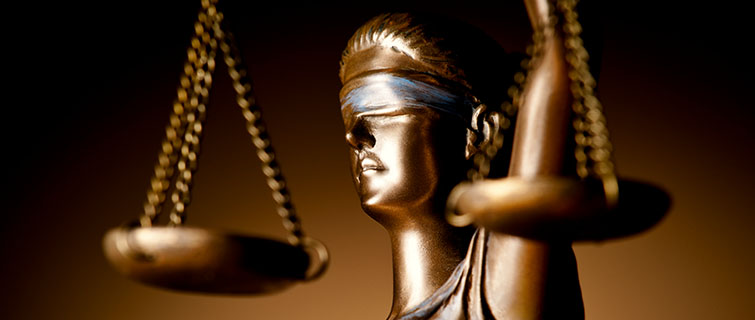
Moments before he was put in a choke hold by a New York City police officer, Eric Garner uttered these words: “Every time you see me you want to arrest me… Please. Just leave me alone.”
Garner was stopped for allegedly selling single cigarettes on a Staten Island street, though he claimed to be selling nothing. A group of officers surrounded Garner, a large man, and took him down when he backed away and tried to avoid being handcuffed. As he fell, one police officer put Garner in a choke hold, then kept his arm around his neck as he lay on the sidewalk. His last words, heard on a video that would become viral, were: “I can’t breathe. I can’t breathe.”
“You Should Leave Angry”
Those words are horrifying in themselves, but it is Garner’s earlier complaint about being continually harassed that concerns the makers of the Netflix documentary 13th, which was shown recently at Georgetown University’s School of Continuing Studies (SCS) following a panel discussion. The documentary cites Garner’s death as an example of a discriminatory criminal justice system that has roots in slavery, Reconstruction, and Jim Crow.
“Regardless of your political affiliation, you should leave this documentary angry,” said Mark Gray, a panelist at the event who is a Research Associate Professor and the Director of CARA Catholic Polls at Georgetown's Center for Applied Research in the Apostolate (CARA). “The challenge is to get people to watch it.”
Gray was joined onstage for the pre-screening panel by Dimitri Roberts, a Law Enforcement Analyst for CNN, and Fr. Pat Rogers, who has spent many years doing prison ministry. The event was hosted by Georgetown’s Liberal Studies programs, which include the Bachelor of Arts in Liberal Studies, Master of Arts in Liberal Studies, and Doctor of Liberal Studies programs, all of which examine important—and often difficult—ethical and philosophical questions throughout history.
The panelists are all connected with the Liberal Studies programs: Gray teaches in the programs, Fr. Rogers is a doctoral candidate, and Roberts is a student in the bachelor’s program.
“It’s extremely important to understand the oppression that targeted groups face every day in America—specifically blacks and Hispanics,” said Alyssa Rashaw, a Bachelor of Arts in Liberal Studies student who suggested the film and helped organize the event. “The prison system in America contributes to this oppression, and it is important to see why and how this is happening.”
A Different Kind of Bondage
The film’s title is an allusion to the Thirteenth Amendment to the U.S. Constitution, which was ratified shortly after the Civil War. While the amendment outlawed slavery, it included a clause that white supremacists would later use to keep former slaves in de facto bondage: “… except as a punishment for crime whereof the party shall have been duly convicted.”
Throughout the South during Reconstruction, former slaves were arrested on fake or petty charges, ensuring that white men would retain economic and political control. A powerful propaganda machine aided this effort with films such as The Birth of a Nation (originally titled The Clansman), which propagated the myth that black men were prone to criminality.
This was not just a historical phenomenon, nor a Southern one. As the film shows, the stigmatization of an entire population crossed geographic and political boundaries, and it still occurs even in today’s criminal justice system.
In 2003, the Bureau of Justice reported that black males had a one in three chance of going to prison in their lifetimes, compared with a one in six chance for Hispanic males, and a one in 17 chance for white males. A 2014 University of Washington study showed that Washington jurors were three times more likely to recommend the death penalty for a black defendant than for a white defendant in a similar case.
The Many Wars on Crime
For politicians, appearing “tough on crime” has generally been a political plus, the film said. In 1971, President Nixon burnished his image as a crime fighter by launching a “War on Drugs.” Only years later was it revealed by former aide John Ehrlichman that the “war” was a political tool used to punish “the antiwar left and black people.”
“Did we know we were lying about the drugs?” Ehrlichman said. “Of course we did.”
In 1988, Massachusetts Governor Michael Dukakis was running well ahead of George H. W. Bush in the polls when a pro-Bush ad appeared showing the menacing face of Willie Horton, a black convicted murderer who committed a rape while on a weekend furlough program that Dukakis had supported. The Democrats’ poll numbers plunged, and he never recovered.
But it was not just Republicans who benefited from the public’s fear of crime. Arkansas Governor Bill Clinton, who became president in 1993, was said to be determined not to appear soft on crime. In 1994 he signed a massive federal crime bill that included harsh “truth-in-sentencing” laws and billions of dollars for the construction of new prisons. He recently said the bill was a mistake.
In 1980, there were about 500,000 adults in jail and prison; by 2013 that number had climbed to more than 2.2 million. Today, African Americans make up about 12 percent of the U.S. population, but nearly 36 percent of those incarcerated. Hispanics represent almost 17 percent of the general population, but nearly 22 percent of those in jail or prison.
“Both political parties built this, and I think, by the same token, there is only a bipartisan solution,” said Gray. “Both parties have to deconstruct this.”
